Resistance Training Once per Week Improves Mental Functioning by 10+%
In the Next Brain Blog we track down and report on a full-range of ways to improve the function and longevity of your brain and mind. There are many studies that prove physical exercise is good for your brain fitness and mental health.
But what type should you do, what specifically does it improve and how long do the effects last? A new piece of research reported in the Archives of Internal Medicine on Resistance Training and Executive Function gives some specific answers.
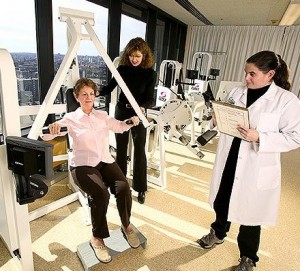 They found that for older female adults resistance training (dumbbells and weight machines) one or twice a week for a year improved their abilities to plan, make decisions, focus and resolve conflicts by more that 10%. These mental tasks all belong to what is called your executive function.
They found that for older female adults resistance training (dumbbells and weight machines) one or twice a week for a year improved their abilities to plan, make decisions, focus and resolve conflicts by more that 10%. These mental tasks all belong to what is called your executive function.
This is an impressive finding because it gives specifics on the type of exercise and the impact it will have. More to the point:
You can get a big boost in mental performance from a modest weekly investment in resistance training.
You don’t need to go to the gym or use fancy weight machines – low cost home exercise equipment will do the trick.
By the way, you can measure the efficiency of your executive function using the Stroop Test. I will blog on that later in the month.
Source: Image
Categories: Cognitive Decline, Decision Making, Lifestyle, Mental Focus, Older Adult, Training Tags: exercise, Stroop Test
Take a Waking Rest After Learning to Boost Retention
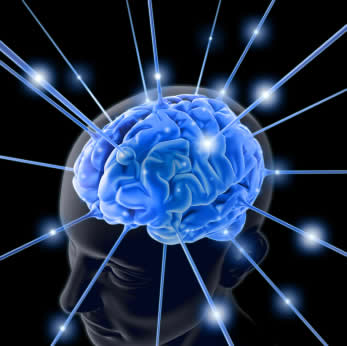 The core idea behind YourNextBrain! is that we have a wide-variety of ways to improve how our minds and brains work. You can for example, improve how keenly you perceive the world, make decisions, solve problems, manage emotions and generate new ideas. You can even improve how you learn. This is called learning-to-learn.
The core idea behind YourNextBrain! is that we have a wide-variety of ways to improve how our minds and brains work. You can for example, improve how keenly you perceive the world, make decisions, solve problems, manage emotions and generate new ideas. You can even improve how you learn. This is called learning-to-learn.
Making a conscious effort to improve our learning processes can pay a big dividend. Learning is both lifelong and lifewide – we are learning all the time and everywhere. Even a small improvement in how we learn is magnified greatly. That’s why I was excited to see the results of a new scientific study from New York University, A Mind at Rest Strengthens Memories, that offers a simple but powerful technique for improving how we learn. What they found is that memories are strengthen during periods of rest even when we are awake. The researchers advise:
“Taking a coffee break after class can actually help you retain that information you just learned,” explained Lila Davachi, an assistant professor in NYU’s Department of Psychology and Center for Neural Science, in whose laboratory the study was conducted. “Your brain wants you to tune out other tasks so you can tune in to what you just learned.”
Of course you don’t need to take a coffee break or be learning by going to class – the principle should work for any form of wakeful resting and learning activity.
For a little more background and insight check out the 4.5 minute video by the researcher.
____________________________________________________________
Source for blue glowing brain image can be found here.
Categories: Lifestyle, Memory and Learning Tags:
Amount of Sugar in Your Blood Impacts Decision-Making Big Time!
 You get a lot of advice on how to make better decisions – sleep on it, shop around, go with your gut and so on. Although a lot of this type of advice sounds like common sense it can be loaded with cognitive biases and decision traps.
You get a lot of advice on how to make better decisions – sleep on it, shop around, go with your gut and so on. Although a lot of this type of advice sounds like common sense it can be loaded with cognitive biases and decision traps.
Learning to make better decisions is a big part of what YourNextBrain! (improving your mind and brain) is about so it will be a frequent topic on this blog. We will look at two aspects:
- Uncovering the biases and traps in everyday decision-making and talking about how to manage them.
- Discussing what decision-making advice holds up under scientific study and how to put it to use.
For example, a recent study reported on the Physorg blog, Got a Decision to Make? Get Some Sugar in Your System, found that our ability to delay gratification is improved if we have sugared up. More specifically, they found that taking a sugary drink actually improves our ability to focus on a larger future payoff versus a smaller but more immediate payoff. This is key for making many types of decision especially about managing money and health. It also supports the common sense advice of never go food shopping hungry.
Higher blood sugar levels means you are less likely to decide impulsively.
Categories: College Student, Decision Making, Diet Tags:
Critical Reasoning Sharpens the Mind But Takes Mega Effort to Develop
 Thinking or reasoning critically is a key cognitive skill. It means we know how to question assumptions, see the logic or lack of logic in an argument, draw sound conclusions from evidence, find root concepts and causes, generate possibilities systematically, avoid decision traps and cognitive biases, see things from multiple points of view and otherwise rigorously deal with ambiguity.
Thinking or reasoning critically is a key cognitive skill. It means we know how to question assumptions, see the logic or lack of logic in an argument, draw sound conclusions from evidence, find root concepts and causes, generate possibilities systematically, avoid decision traps and cognitive biases, see things from multiple points of view and otherwise rigorously deal with ambiguity.
Critical thinking is so important that it has been a major area of focus since the time of the ancient Greek philosophers. But it is not just a philosophical thing. For example, in a recent post on the Harvard Business Review’s blog How Leaders Should Think Critically, the authors argue that it is a fundamental skill for today’s business leaders and students. Of course the same arguments apply to non-business school students and leaders as well as everyone trying to make their way in today’s complex society.
In short, enhancing critical thinking is an important option for anyone interested in building a sharper mind and will be a regular topic on this blog.
But how can you improve it? Self-study using a book or web resource is a good way. I’ll make a couple of recommendations below. You can also scout out a class or seminar at a location near you. For those who like a more guided approach, you can contract the services of a tutor or philosophical counselor.
No matter how you start please be sure to share your experiences with other readers of this blog.
For a good introductory text on critical reasoning see, Thought and Knowledge: An Introduction to Critical Reasoning. It is relatively inexpensive, easy to read and covers basic and advanced topics. It has a more psychological than philosophical orientation and provides nice chapter summaries. You can access it online on Questia here.
For a very comprehensive free treatment, check out Critical Reasoning a User’s Manual (version 3.0). It is a 640-page (3 MB) PDF. It is also available online in the document reader Scribd here.
Both these resources will take an enormous effort to get through! If you are aware of a better general introduction please comment on this post. In the meantime, I will blog on specific techniques that you can use to build critical reasoning skills with much less effort.
Categories: Ancient Ways, Books, Decision Making, Problem Solving, Training Tags: critical reasoning, critical thinking
Two Cups of Blueberry Juice Daily Significantly Improves Memory
What we eat and drink as well as the medications and supplements we take can strong determine the effectiveness of our cognitive functions and how long we have a health brain. Expect to see many posts on ingestibles and how they can be used to develop YourNextBrain! in this blog.
Sometimes we will debunk findings. For example the post, Herb Fails to Prove Out as Cognitive Enhancer, reviews evidence that Ginko Biloba the popular memory supplement does not work. Other times we will present brand new but preliminary positive findings. For example, the recent news release from the American Chemical Society that presents First Ever Evidence that Blueberry Juice Improves Memory in Older Adults. This is an exciting finding.
To quote:
“In the study, one group of volunteers in their 70s with early memory decline drank the equivalent of 2-2 l/2 cups of a commercially available blueberry juice every day for two months. A control group drank a beverage without blueberry juice. The blueberry juice group showed significant improvement on learning and memory tests, the scientists say. “These preliminary memory findings are encouraging and suggest that consistent supplementation with blueberries may offer an approach to forestall or mitigate neurodegeneration,” said the report.”
A preliminary result but it does encourage some sensible personal experimentation. It would not be too hard to swap out a daily drink such as orange juice or a bottled water with blueberry juice. Simple before/after memory tests can be used to see if you are making any headway.
I am very interested to hear from readers with ideas or examples of personal experiments with blueberries as memory enhancers.
Categories: Diet, Memory and Learning, Older Adult Tags: fruit
Do You Have You Membership to a Brain Gym?
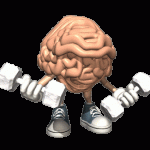 Over the last five years dozens of companies offering software to “train your brain” have sprung up. The software is often a structured time-based test or some form of a game. It can run on your PC , game console or even your smart phone. The idea is to give your brain a work out much like going to a gym. To see a brain working out click on the image to your right.
Over the last five years dozens of companies offering software to “train your brain” have sprung up. The software is often a structured time-based test or some form of a game. It can run on your PC , game console or even your smart phone. The idea is to give your brain a work out much like going to a gym. To see a brain working out click on the image to your right.
But what are they proven to do for your brain? Many claim to improve memory, visual perception, planning and help avoid cognitive decline as we age. Most have studies that show you will improve on the tasks in the software but what is less clear is if that transfers to doing similar cognitive tasks in other setting such as those in daily living or at work.
Brain or cognitive training software is rapidly advancing and will be a regular topic on this blog. There is little doubt that it is an important tool for building YourNextBrain!
![]() To give brain fitness software a try, click on this demo of the Personal Coach from CogniFit (you may need to scroll down the page and click the demo button). To get a better understanding of how CogniFit approach brain training works watch a 3-minute video of why it is effective.
To give brain fitness software a try, click on this demo of the Personal Coach from CogniFit (you may need to scroll down the page and click the demo button). To get a better understanding of how CogniFit approach brain training works watch a 3-minute video of why it is effective.
I am not endorsing the CogniFit product just offering it as an example. If you are interested in this type of technique for building YourNextBrain! comment on this post and I will reply with a list of leading vendors and products.
Looking forward to hearing about your experiences at the brain gym.
———————————————————————————————–
Source for image above of brain exercising can be found here.
Categories: Memory and Learning, Other, Perception, Problem Solving, Software, Training Tags: brain fitness, brain gym, brain training, cognitive fitness
Use Integrative Thinking to Crack Hard Problems
 There are literally dozens of methods you can use to solve problems. We will try to cover all of them in this blog. The latest crop are driven by the idea that we can become better problem solvers if we learn to think like professionals that are really good problem solvers. Makes sense. For example, in design thinking we try to think like a successful designer or in leadership thinking we try and think like a highly effective leader.
There are literally dozens of methods you can use to solve problems. We will try to cover all of them in this blog. The latest crop are driven by the idea that we can become better problem solvers if we learn to think like professionals that are really good problem solvers. Makes sense. For example, in design thinking we try to think like a successful designer or in leadership thinking we try and think like a highly effective leader.
One approach to think-like-a-leader that has worked for me comes from the Rotman School of Management at the University of Toronto. It is called integrative thinking. In essence it is:
“the ability to constructively face the tensions of opposing models, and instead of choosing one at the expense of the other, generate a creative resolution of the tension in the form of a new model that contains elements of the individual models, but is superior to each. “
Easy to say but hard to do. The payoff however can be enormous as this often used quote by F. Scott Fitzgerald suggests:
“The test of a first-rate intelligence is the ability to hold two opposing ideas in mind at the same time and still retain the ability to function”
In the language of this blog integrative thinking is an important option for building Your Next Brain!
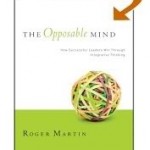 To dig deeper check out the book, The Opposable Mind: How Successful Leaders Win Through Integrative Thinking. You can get a free preview of the book here. Or if you have more money to spend and want some personal training consider the 3-day executive program in Toronto this April. I will blog on my experiences later. Meanwhile please share your ideas and experiences with integrative thinking techniques.
To dig deeper check out the book, The Opposable Mind: How Successful Leaders Win Through Integrative Thinking. You can get a free preview of the book here. Or if you have more money to spend and want some personal training consider the 3-day executive program in Toronto this April. I will blog on my experiences later. Meanwhile please share your ideas and experiences with integrative thinking techniques.
Categories: Books, Decision Making, Executive, Leader, Problem Solving, Training Tags: cognitive dissonance, integrative thinking
Enhanced Music Accelerates Brain Function
There is no doubt music stimulates our brain. Listening to your favorite song can generate a flood of emotions and memories. But can music be used to enhance mental focus, IQ, memory or otherwise build your NextBrain?
According to Volition Thought House the answer is yes. They have developed a way to spike normal music with beat patterns and frequencies to build your brain strength automatically while listening. The product is called iMusic and is an example of Brainwave Entrainment.
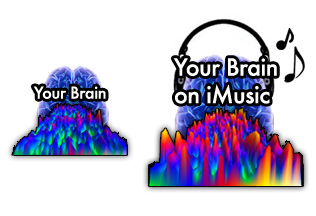 The company has done several small research studies that demonstrate positive effect (including one that shows improved sleep), has a patent and explain the technology fairly clearly in several white papers.
The company has done several small research studies that demonstrate positive effect (including one that shows improved sleep), has a patent and explain the technology fairly clearly in several white papers.
You can get a free sample here but have to listen to a lot of commercials. If you do the free sample be sure to hit “play list” and watch the 3rd testimonial. It is by a physician that took a hard look and was impressed.
I tried an earlier free sample and loved it! Perhaps it is a placebo effect but I felt more focused and energized while listening. Products range from $20-$120 and I’ve placed an order.
I will blog on my experiences later. Meanwhile please share your ideas and experiences with music-based cognitive improvement techniques.
Categories: IQ and EQ, Memory and Learning, Mental Focus, Music and Audio, Sleep Tags: Brainwave Entrainment

